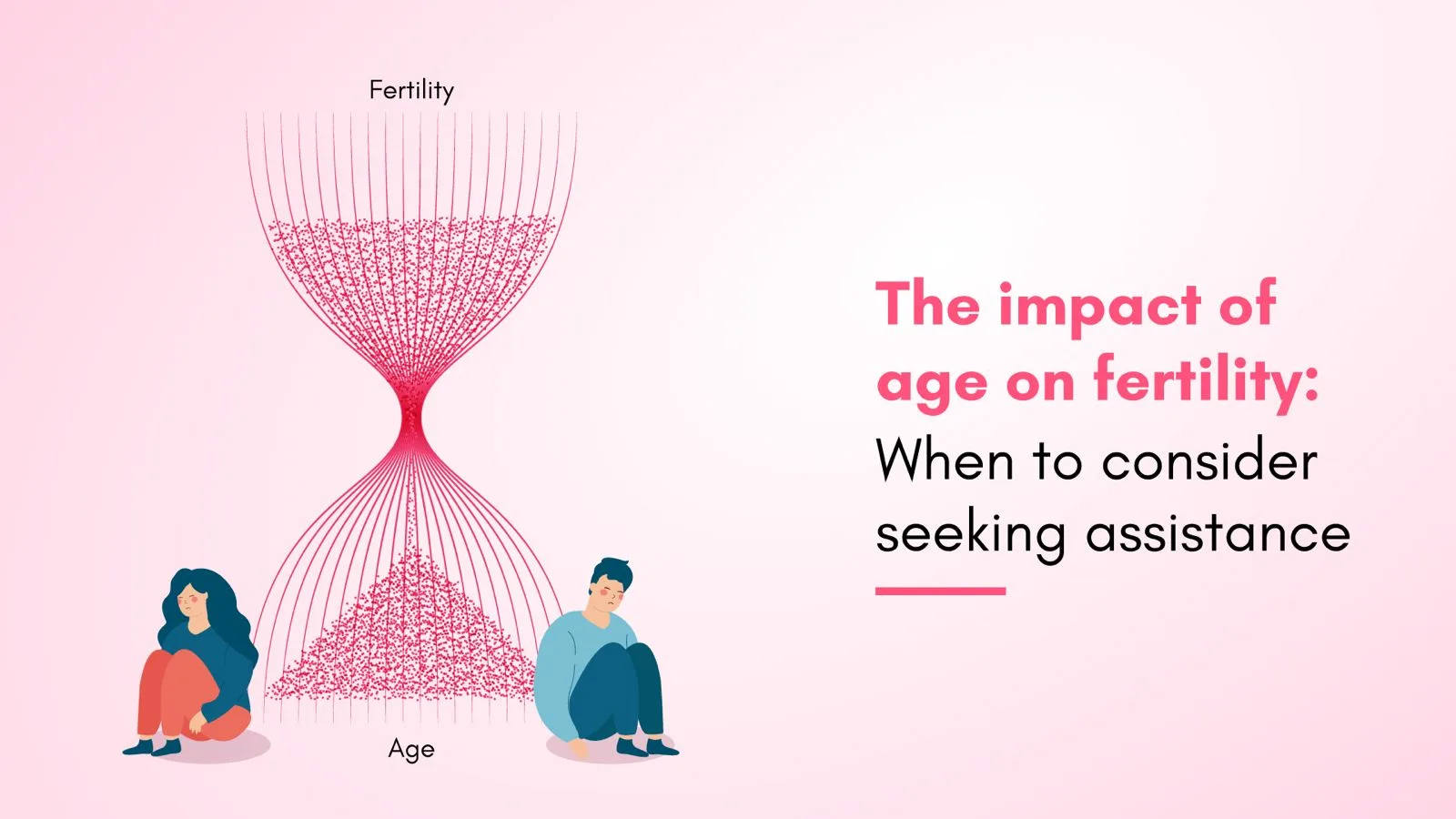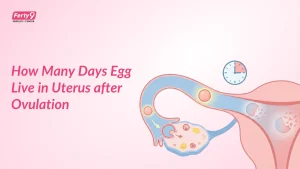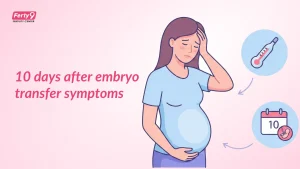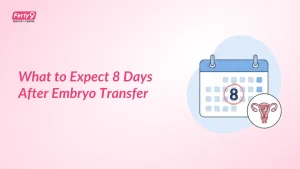The remarkable innovations in fertility preservation and egg-freezing techniques have offered hope to couples who are seeking to preserve their reproductive potential. This is because once the best age to get pregnant is gone, it gets difficult for women to conceive naturally because the egg reserve decreases in the body.
Although late pregnancy can be challenging for many couples, one can implement a few tips for getting pregnant even after the age of 35 years and enjoy the parenthood journey. So, let’s learn some facts and tips that will help you with late pregnancy and understand what age women are most fertile.
Female Fertility And Age
Eggs that are released every month during ovulation are the key to conception in women, and they are born with it. As she ages, the quantity and quality of these eggs start to decline, and this has a great impact on her fertility. No matter how much a woman takes care of herself, her chances of fertility decrease by the age of 35. Each time she ovulates, she loses her eggs, and that lowers the chances of getting pregnant with the passing time.
The best age to get pregnant with PCOS or without it is early to mid-20s because during this time, the chances of conception are 25-30% every month. Women enter their menopause phase after 40, and that’s when the menstrual cycle stops, which drastically lowers the chance of getting pregnant naturally.
Male Fertility and Age
Although male fertility starts declining later than females, the early 20s to late 30s is considered the best age to get pregnant. As men reach the age of 40-45, the sperm quality decreases, and that leads to challenges with fertilization. Since age and fertility in males are the factors that are necessary for a woman to get pregnant, it should be done while sperm is at its best quality so that fertilization can take place naturally.
Fertility Across Different Age Groups
Fertility in the 20s
The 20s is the decade in which the body is at its greatest fertility potential, and the chances of conceiving naturally are relatively higher than in later ages. The chances of miscarriage, chromosomal abnormalities , infertility are low, and it is a safe time of life to have children. Although it is possible to have difficulty conceiving at this age, the chances of this happening are lower. Also, the sperm count and quality in men around this age have a high potential to get their partner pregnant naturally.
Fertility in the 30s
Women in their 30s lose a certain amount of eggs, which lowers the chances of pregnancy by 15-20% each month. Not only that, the quality and quantity of the eggs start to decline around this age, and the risk of miscarriage gets higher. The average time to get pregnant by age in women is 35 because there are other environmental factors that may affect her and add pressure physically and mentally.
Fertility in the 40s and beyond
40 and beyond is the time when the body is at obstetrical risk, such as gestational diabetes, hypertension, chromosomal abnormalities, etc., alongside the decline in egg quality. The chances of getting pregnant with one’s own egg reduce to 1% by this time, and thus, couples opt for ART. In such cases, women can freeze their own eggs at a young age for future fertilization or may have to take the help of egg donors or other possible solutions.
When To Consider Seeking Fertility Assistance
Women in their 20s and 30s must try to conceive naturally for a year, and if they experience failure after multiple trials, then they must go and consult a fertility specialist. However, a woman in her 40s crosses the natural women’s pregnancy age and must go with the fertility treatments if looking to enter motherhood. There are various factors, such as menopause, pelvic abnormalities, egg quality, sperm count, sexual dysfunction, and other medical conditions, that play a role in causing infertility.
The chances of getting pregnant through the natural process of women in their 40s are lower as they pass the best age to get pregnant. Hence, they receive fertility assistance such as intrauterine insemination and in vitro fertilization to conceive.
Fertility Evaluation And Testing
The couple goes through laboratory tests, imaging tests, counseling, and other procedures when visiting the fertility center because it helps the specialists determine the chance of conception by age and other factors. Since both males and females are required for conception, both of them undergo these tests. More tests are done on women than men, such as ultrasound exams, sonohysterography, Hysterosalpingography, hysteroscopy, laparoscopy, and blood tests.
In some cases, men undergo ultrasound scrotum to determine the problems with fertility. In older people, the number of eggs and sperm decreases with age, and these tests are done to get an insight into their IUI and IVF success rates by age because these options might be needed for them after the female passes the best age to get pregnant.
Fertility Treatment Options
If a couple is having trouble getting pregnant after multiple tries, then they must seek medical help and visit the best fertility center so that the real cause can be diagnosed. This generally happens once the couple passes the best age to get pregnant, but with the advancement of medical technology, one can enjoy their journey of parenthood even after their 40s.
To tailor the best fertility treatment for the couple, certain tests are required to prepare the age fertility chart of both partners. Since aging and fertility are indirectly proportional to each other, age is the first thing that is seen when the couple is trying to get pregnant. Once the causes for infertility are concluded, the couple, especially the woman, is given the best fertility treatments.
- Fertility MedicationsThe chances of getting pregnant by age in women decline as their egg quality starts to decrease each month. Thus, they are given oral medications and injectables to induce ovulation.
- In Vitro Fertilization (IVF)IVF is the process in which eggs are retrieved from the woman’s body after they are given medication and injectables and kept in a laboratory dish. The embryologist later uses a sperm to fertilize that egg, and once it is successful, the embryo is injected inside the woman’s body.
- Intrauterine Insemination (IUI)The tests help to determine the IUI success rate by age because it is a process in which the sperm of the partner is inserted into the uterus using a catheter. The age and female fertility chart plays an important role here because sperm and eggs are induced to fertilize naturally in the body.
- Third-Party ReproductionSince the aging eggs fertility declines and their quality makes it difficult to fertilize inside or outside the body, third-party reproduction is considered. This is because there is a decrease in fertility by age of both men and women. So some couples might need to consider egg/ sperm donation is the best way for the couple to achieve pregnancy.Related Read: Does age affect fertility treatment?
Lifestyle Factors and Age-Related Fertility
Lifestyle factors play a pivotal role in influencing age-related fertility, highlighting the importance of holistic well-being in reproductive health. The fertility age of females starts to decline after 35, and the age of fertility of males declines after 40, which increases the risk of miscarriages and other abnormalities. Although advancing age is inherently associated with a decline in fertility, certain lifestyle choices can not be overruled.
Excess body weight, hormonal imbalance, menstrual regularity, smoking, excessive alcohol consumption, and bad eating habits can exacerbate these age-related effects. So, if one is planning to conceive at a late or right age, these few choices must be made in favor of fertility, and necessary modifications must be made to impact reproductive health positively.
Lifestyle choices are crucial when it comes to pregnancy, whether the couple has crossed the best age to get pregnant or not.
Related Read: Lifestyle Options to support female infertility treatment
Related Read: Boosting Naturally Male fertility with Diet, Lifestyle Changes
Emotional Considerations
As the chance of pregnancy by age decreases, it starts to create immense emotional stress, especially when one tries multiple times with results, not in the favor. Both partners often face a rollercoaster of emotions that range from anticipation to frustration to disappointment during this phase, and thus, consideration for each other is paramount.
It is important for couples to acknowledge and communicate their feelings and foster a supportive environment so that they can successfully navigate the journey of conception. Both partners need empathy, understanding, and open communication to motivate each other to try again.
Although it is challenging with old age and female fertility declining, it is not impossible to get pregnant at later ages because of fertility prevention and egg-freezing techniques. If one is planning conception later because of personal reasons or other circumstances, then one can retrieve the eggs when they are of high quality and preserve them for use in the future. Of course, this should be the joint decision of the couple because a lot of emotions are attached to it.
Related Read: The Impact of Stress on Fertility
Conclusion
The analysis of male and female fertility age charts helps the experts understand which fertility treatment is the best for them. If the couple’s diagnostic tests are normal,then only medications to induce ovulation are given, whereas they opt for IVF and IUI if the eggs cannot fertilize naturally. Apart from that, there are surrogacy and donor options, too, if the intended couple’s eggs and sperm are not of fertilization quality.
Since medical science has evolved a lot in this field, it is best to preserve the eggs in the embryology lab and get them fertilized when one plans to get pregnant. IVF and IUI are the best ways to conceive once the best age to get pregnant is gone, depending upon the choices and health condition of the couple.





























